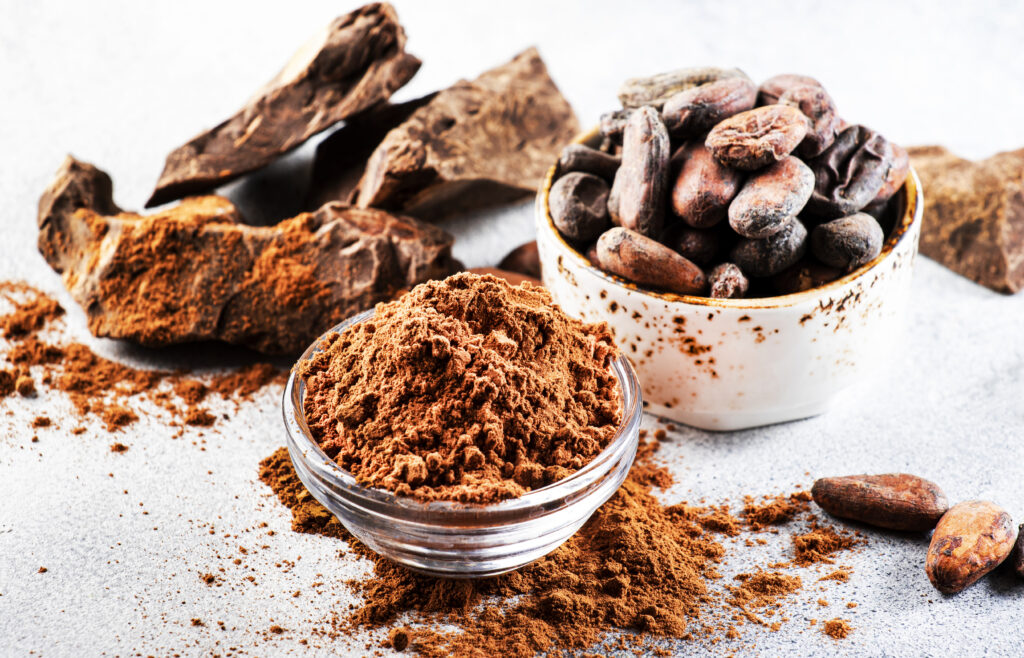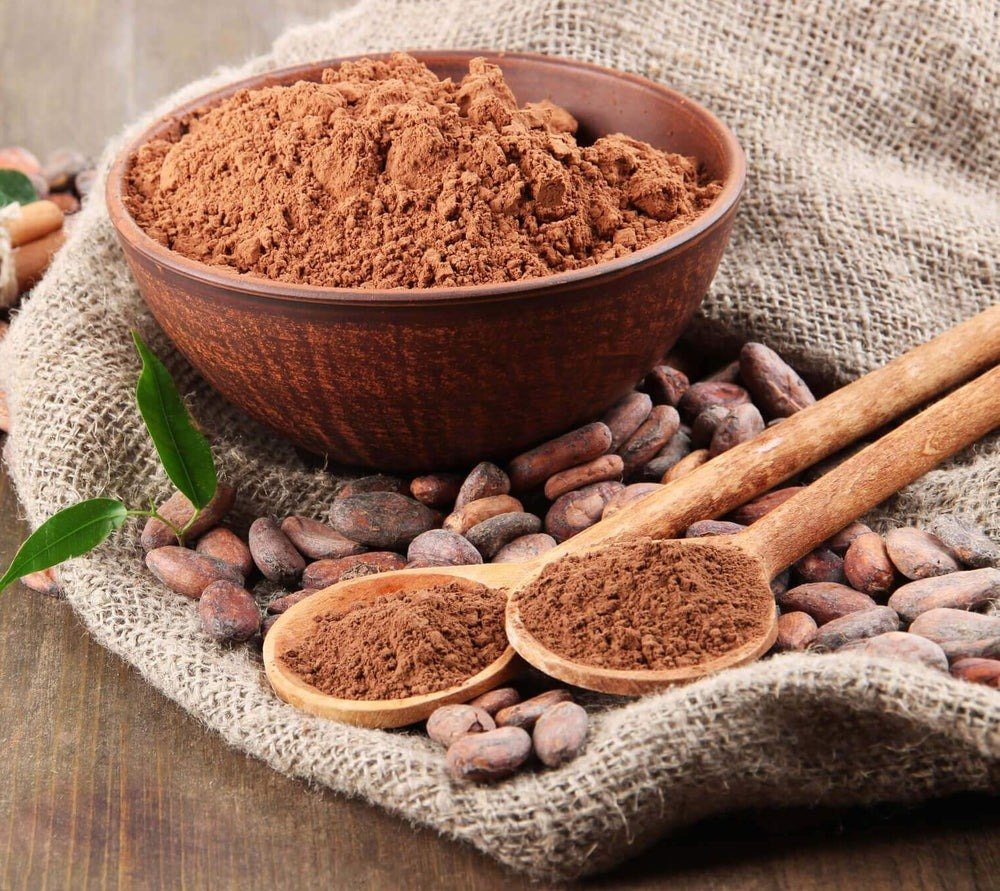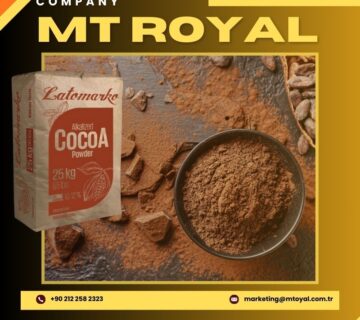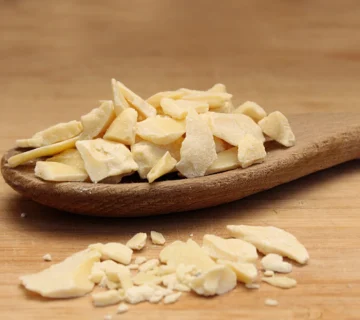In Iraq’s growing food and confectionery industry, the subtle difference between a good chocolate bar and a great one often comes down to one ingredient: cocoa powder. Specifically, alkalized cocoa powder—also known as Dutch-processed cocoa—has become the go-to choice for many industrial manufacturers. Its rich, mellow flavor, deep color, and consistent performance make it essential for large-scale chocolate, bakery, and dairy production.
Yet sourcing the right alkalized cocoa powder in Iraq isn’t simply about finding a supplier; it’s about selecting a partner who understands industrial needs, quality requirements, and logistical challenges. At MT Royal, we’ve seen factory managers transform their production lines by switching to reliable suppliers and premium-grade cocoa powders, including European benchmarks like Latamarko, whose Spanish engineering ensures consistent performance at scale.
In this article, we explore everything manufacturers need to know about alkalized cocoa powder: from its definition and applications to procurement strategies, quality considerations, and actionable tips for optimizing industrial production in Iraq.
Understanding Alkalized Cocoa Powder
What Is Alkalized Cocoa Powder?
Alkalized cocoa powder is made by treating natural cocoa powder with an alkalizing agent, typically potassium carbonate. This process, known as Dutch processing, neutralizes acidity, darkens the powder, and produces a smoother, milder flavor.
Key characteristics include:
- Darker color than natural cocoa, ideal for visually appealing chocolates and baked goods.
- Lower acidity, allowing more flexibility in recipes and reducing bitterness.
- Improved solubility, making it easier to incorporate into chocolate beverages, syrups, and fillings.
Industrial buyers favor alkalized cocoa powder because it offers predictable flavor and color, essential for maintaining product consistency across large batches and multiple production lines.
Natural vs. Alkalized: Choosing the Right Cocoa
While natural cocoa retains more acidity and sharper notes, alkalized cocoa provides a smoother, more uniform flavor. Many Iraqi chocolate, bakery, and dairy manufacturers use a blend of both types to balance flavor intensity, color, and processing characteristics.
MT Royal offers a wide range of both natural and alkalized cocoa powders, helping factories tailor formulations for every product category—from dark chocolate coatings to milk-based desserts.
Industrial Applications in Iraq
Alkalized cocoa powder is highly versatile across multiple production environments:
1. Chocolate Manufacturing
Its smooth, mild flavor is ideal for chocolate coatings, fillings, and compound chocolate production. In large-scale factories, alkalized cocoa ensures uniform color and predictable viscosity, reducing downtime caused by clumping or uneven mixing.
2. Bakery and Confectionery
Alkalized cocoa is commonly used in cakes, cookies, brownies, and pastries. Its neutral pH means it doesn’t react aggressively with baking soda, producing consistent texture and color across batches—a critical requirement for industrial bakeries in Iraq.
3. Dairy Products and Beverages
From chocolate milk to dessert creams, alkalized cocoa blends smoothly, enhancing mouthfeel and aroma retention. Iraqi beverage producers often rely on it for powdered mixes and instant chocolate drinks, where solubility and taste stability are essential.
4. Functional and Nutritional Foods
Producers of protein bars, fortified snacks, and energy mixes use alkalized cocoa to mask bitterness while providing rich chocolate flavor without affecting the functional properties of other ingredients.
Benefits of Alkalized Cocoa Powder for Manufacturing Plants
For Iraqi factories, the advantages of using high-quality alkalized cocoa powder are substantial:
| Benefit | Impact on Industrial Production |
|---|---|
| Consistent Color | Ensures brand-standard product appearance across multiple batches. |
| Uniform Flavor | Reduces batch-to-batch variation in chocolate or baked goods. |
| Improved Solubility | Easier incorporation in beverages, syrups, and emulsions. |
| Reduced Acidity | Minimizes recipe adjustment needs and protects machinery from corrosion. |
| Extended Shelf Life | Less acidic cocoa contributes to longer-lasting products in storage. |
Factories that invest in premium cocoa powders, such as Latamarko’s European-grade alkalized cocoa, often see measurable improvements in product quality, efficiency, and customer satisfaction.
Common Pitfalls in Industrial Cocoa Procurement
Even experienced procurement teams sometimes face challenges when sourcing alkalized cocoa powder:
1. Overemphasis on Price
Selecting the lowest-cost powder may save upfront costs but can lead to higher production losses due to inconsistent quality, clumping, or processing issues.
2. Ignoring Batch Consistency
Without rigorous supplier controls, color and flavor variability can create deviations across batches—critical in high-volume chocolate production.
3. Improper Storage
Alkalized cocoa is hygroscopic. Excess humidity or heat in Iraqi warehouses can cause caking or spoilage, affecting solubility and processing behavior.
4. Lack of Technical Support
Some suppliers provide products without guidance on optimal dosing, blending, or compatibility with other ingredients, leading to inefficiencies on the factory floor.
At MT Royal, we address these issues by combining stable supply, technical consultation, and multiple sourcing options, ensuring Iraqi manufacturers consistently receive high-performing cocoa powder.
Quality Considerations for Industrial Buyers
When evaluating suppliers of alkalized cocoa powder, focus on these parameters:
| Quality Factor | Importance for Manufacturing | Typical Range/Recommendation |
|---|---|---|
| Fat Content | Influences texture, viscosity, mouthfeel | 10–12% standard, 20–22% premium |
| pH Level | Determines taste and reaction with other ingredients | 6.8–8.1 (alkalized) |
| Particle Size | Affects dispersibility and smoothness | <75 microns preferred |
| Moisture Content | Prevents caking and ensures shelf life | <5% |
| Color Uniformity | Maintains consistent product appearance | Stable reddish-brown to dark brown |
| Certifications | Food safety and traceability | ISO, HACCP, FDA/EU compliance |
European brands like Latamarko are noted for meeting these parameters consistently, providing Iraqi manufacturers with predictable performance across large-scale operations.
MT Royal: Partnering with Iraq’s Manufacturing Sector
At MT Royal, we supply a comprehensive portfolio of alkalized cocoa powders to factories across Iraq, from chocolate manufacturers in Baghdad to bakery plants in Basra. Our offerings include multiple origin options and European premium grades, enabling procurement teams to select powders tailored to their specific applications.
Why Manufacturers Choose MT Royal
- Reliable bulk supply: Containers, totes, and bagged formats.
- Technical guidance: On dosage, blending, and storage optimization.
- Diverse brands: From cost-efficient options to premium European suppliers like Latamarko.
- Consistency assurance: Rigorous QA and COA documentation for every batch.
In our experience supplying manufacturing facilities, plants that leverage our technical support see fewer production disruptions and higher output quality—making supply chain reliability a competitive advantage.
Real-World Manufacturing Examples
Chocolate Coating in Baghdad
A factory producing compound chocolate coatings switched to MT Royal’s alkalized cocoa with European specs. Results included:
- Smoother texture, reducing mixing energy by 12%.
- Darker, more uniform color, enhancing product presentation.
- Reduced clumping during storage, cutting waste by 8%.
Bakery Applications in Erbil
A biscuit producer faced inconsistent cake coloration with natural cocoa. After switching to alkalized cocoa, batches achieved:
- Uniform color and flavor profile
- Reduced recipe adjustment for baking soda
- Enhanced shelf-life stability
Dairy and Beverage Production in Basra
An instant chocolate milk line required quick dispersibility. MT Royal’s alkalized cocoa powders blended efficiently, eliminating the need for additional processing aids.
Pro Tips for Iraqi Production Managers
- Match Cocoa Type to Recipe – Use alkalized cocoa where smooth, mild flavor is desired; reserve natural cocoa for sharper notes.
- Monitor Mixing Temperatures – Overheating can reduce flavor retention in chocolate and beverages.
- Document Lot Numbers – Track batches to quickly identify potential issues.
- Control Storage Conditions – Keep powders in sealed, climate-controlled areas to maintain solubility.
- Collaborate With Suppliers – Technical input on dosage, blending, and process adjustments saves time and costs.
These operational practices ensure process efficiency, product consistency, and optimized ingredient usage.
Trends Shaping Alkalized Cocoa Use in Iraq
- Premiumization of Local Chocolate Brands: Iraqi factories seek European-quality cocoa to compete regionally.
- Automation Integration: High-speed lines require powders that disperse predictably under mechanical mixing.
- Sustainability and Traceability: Export-oriented manufacturers demand ethical sourcing and certification.
- Consumer-Driven Clean Label Movement: Alkalized cocoa helps meet flavor consistency while aligning with natural ingredient trends.
FAQs from Iraqi Procurement Managers
Q1: Can alkalized cocoa replace natural cocoa in recipes?
Yes, but flavor and acidity will differ. Adjust leavening and sweetness accordingly.
Q2: What storage life can we expect?
Sealed and stored properly, 18–24 months without flavor loss.
Q3: Does higher fat content improve taste?
Yes. High-fat powders (20–22%) yield richer texture in chocolate fillings and coatings.
Q4: Why consider Latamarko?
Spanish engineering and quality control ensure batch-to-batch consistency, ideal for industrial-scale applications.
latamarko alkalized cocoa powder lm60
cocoa powder for chocolate production-Best price
Food industry raw materials – list of products
Types of Gelatin from Turkish Manufacturer
Alkalized Cocoa Powder Bulk Supplier







No comment